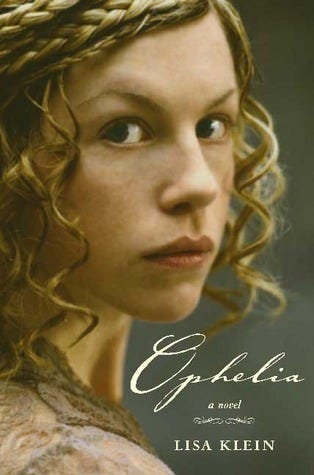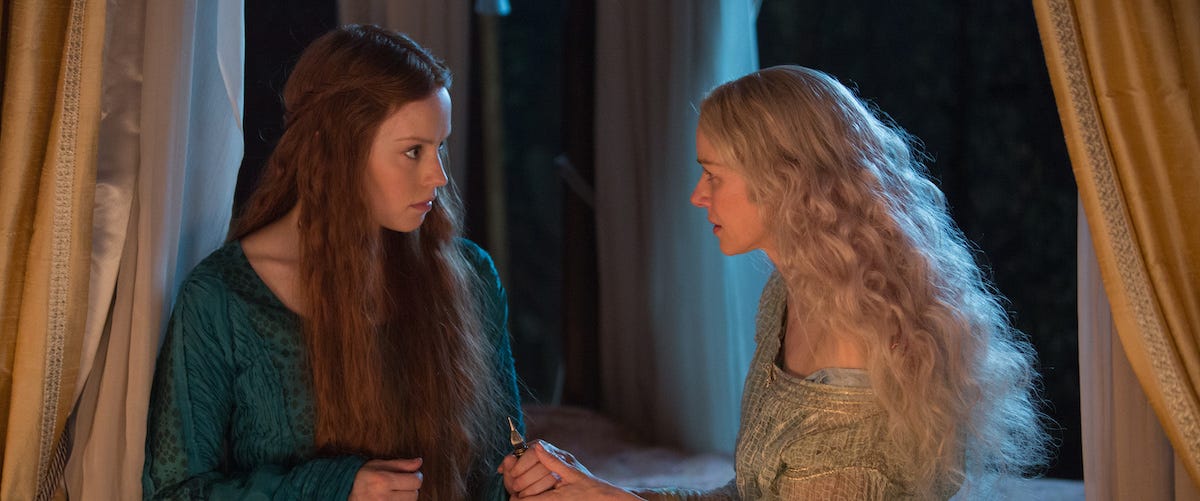Daisy Ridley as Ophelia (2019)
Let's take a look at a performance, shall we? Some spoilers because it's unavoidable, but I'm not going into detail about every plot point because it's a good movie and you should watch it!
It’s ironic how excited I was for the movie Ophelia considering I did all I could in my younger days avoiding the book it was adapted from. Based off of Lisa M. Klein’s Young Adult novel Ophelia, the book follows the plot of Hamlet from our tragic heroine’s perspective, giving reader’s insight into her character and agency that she doesn’t receive in the original play.
I’d read another one of Klein’s Shakespeare Young Adult adaptions, Lady Macbeth’s Daughter, who’s plotline is basically given away in the title. I remember greatly disliking the book, and for that reason I avoided Ophelia even though it’s the exact type of book I’d want to read. What can I say? My stubbornness is a powerful thing. The book made it’s rounds a bit on Goodreads though, in part because it was a pretty new trend to have side-characters become protagonists in adapted materials. Another reason (as I fondly remember it) was because Ophelia was being referred to as Michael Cera as Ophelia.
So I haven’t read the book, but I hope to one day. I have however seen the movie. Not until this year, but you can blame the pandemic on that. Sixteen years later after it’s original publication, Ophelia is not portrayed by Michael Cera but by Daisy Ridley, and she does an excellent job in the role.
The audience is introduced to what appears to be a poor little boy running around the castle of Elsinore with a few other young children. The young boy stumbles and is finds himself in a hall where a celebration is taking place. The King, Queen, King’s brother, and the young price are in attendance (Nathanial Parker, Naomi Watts, Clive Owen, and Jack Cunningham-Nuttall respectively) as well as the boy’s father (Dominic Mafham). When the boy is found, the Queen goes to him and takes off the little boys cap and it is revealed that the little boy we have been following isn’t a little boy at all, but a little girl, Ophelia (Mia Quiney). Feeling for the wild little girl who has no mother, the Queen Gertrude decides to take Ophelia as a Lady-in-Waiting and a montage ensues in which the little girl’s long, matted hair is painfully brushed out and she is taught the ways of a noble woman until time skips ahead and she is a young woman (Daisy Ridley) of the court.
Quiney’s portrayal as a young Ophelia is brief but memorable, and sets up the character beautifully. We see that from a young age Ophelia wants more than is expected of her as a young girl. She wants to run and explore and be wild, and though Gertrude takes her under her wing as a Lady-in-Waiting. We see examples of this wildness though in scenes where Ophelia is shown swimming in a large lake and gathering flowers early on in the film, something no Lady-in-Waiting should do but Ophelia finds private moments for. These two scenes are of course relevant as long-time symbols associated with the character, her often romanticized death and her knowledge of the meaning of flowers which is used in her mad scene.
Ridley does an excellent job portraying Ophelia as both an obedient lady of the court who finds rebellion in smaller ways, such as swimming in the lake, picking flowers, or reading as her brother Laertes taught her to do. Ophelia is still shown to be silent, but it is a silence of observance, a silence that helps her gain the trust of Gertrude, that allows Ophelia to notice the “specter” before King Hamlet is killed. Through her silence and outward appearance of obedience, Ophelia becomes Queen Gertrude’s most trusted Lady-in-Waiting which allows her to be privy to the inner workings of the court, and the rot seeping into Elsinore.
McCarthy’s film also gives more of a backstory on the relationship between Hamlet and Ophelia. They first meet as young children when Ophelia finds her way into the celebration that ends up changing the course of her life, and later when they are older when Hamlet and Horatio (George MacKay and Devon Terrell) find Ophelia as she is swimming in the lake. They share words, attend a ball, and eventually marry in secret. Ophelia’s morality in consummating her and Hamlet’s relationship after their marriage directly contrasts that of Queen Gertrude who is heavily implied in this film to have been unfaithful to King Hamlet with Claudius while she was still married to him.
And then, of course, there are the scenes directly from Shakespeare’s play. The nunnery scene is not shown as privately as it is implied in the original play. Concerned about Hamlet’s madness and directly blaming Ophelia, Ophelia is locked into a room with Hamlet while Claudius, Polonius, and other members of the court watch. During the scene it’s becomes clear that Hamlet is feigning madness, and Ophelia plays up the scene pretending to be afraid of him while whispering information she has learned, like that Claudius killed his father.
Ophelia’s madness is also revealed to be feigned to the audience. Proving to dangerous for the court, Ophelia is almost forced to marry a noble member of the castle as a way of permanently silencing her and getting her to leave Elsinore. Ophelia manages to escape the nuptials and finds herself in the room she stumbled into as a child in the beginning of the film. It’s a sharp contrast to the bright and lavish ceremony at the beginning of the film, now the lighting is dark, the atmosphere tense as Ophelia walks in on Gertrude, Claudius, Laertes, Horatio and other members of the court eating. Wearing her white wedding gown, Ophelia grabs flowers off a nearby table and starts to hand them out to those sitting, explaining their meanings and to Horatio sharing another message with him.
Ophelia then runs down to the lake where guards chase after her. Avoiding marriage to a man she doesn’t know or love, and a possibility of death or being jailed, Ophelia consumes a potion and grows weaker in the water, presumably drowning as the guards find her body looking reminiscent of Millais’ infamous painting of her death. But much like the feigned madness, Ophelia’s death is also fake and she awakens, returning to Elsinore disguised as a man (Osric) just as she did as a child, as she attempts to take Hamlet away with her so they can live safely.
Ophelia gives it’s titular character a chance to speak. Through Ridley, Ophelia is given agency and is made a much more complex character than she is typically recognized as. Ridley gives Ophelia a quiet power as a woman who knows that she is limited in what she can do to bring about change but finds ways to rebel as best she can. Having Ophelia participate in the theme feigning madness, the character uses expectations of her gender as a hysteric woman to gain safety for herself, and further protects herself by faking her death. Ridley’s performance let’s audience members know that Ophelia is intelligent, but that she can’t share that in court. Instead she must plan, prepare, and use what is expected of her because of her gender to get ahead and protect herself from the dangers inside the Danish court.
Ophelia is a long movie, nearly two hours in length, but arguably many of Shakespeare’s productions are longer than this movie. It’s definitely worth the watch, and if you want to see Ophelia gain some agency she’s so rarely shown as having, this is a movie and performance you won’t want to miss!
Sources:
Klein, Lisa, and William Shakespeare. Ophelia: A Novel. Bloomsbury, 2008.
McCarthy, Claire, director. Ophelia. IFC Films, 2019.








